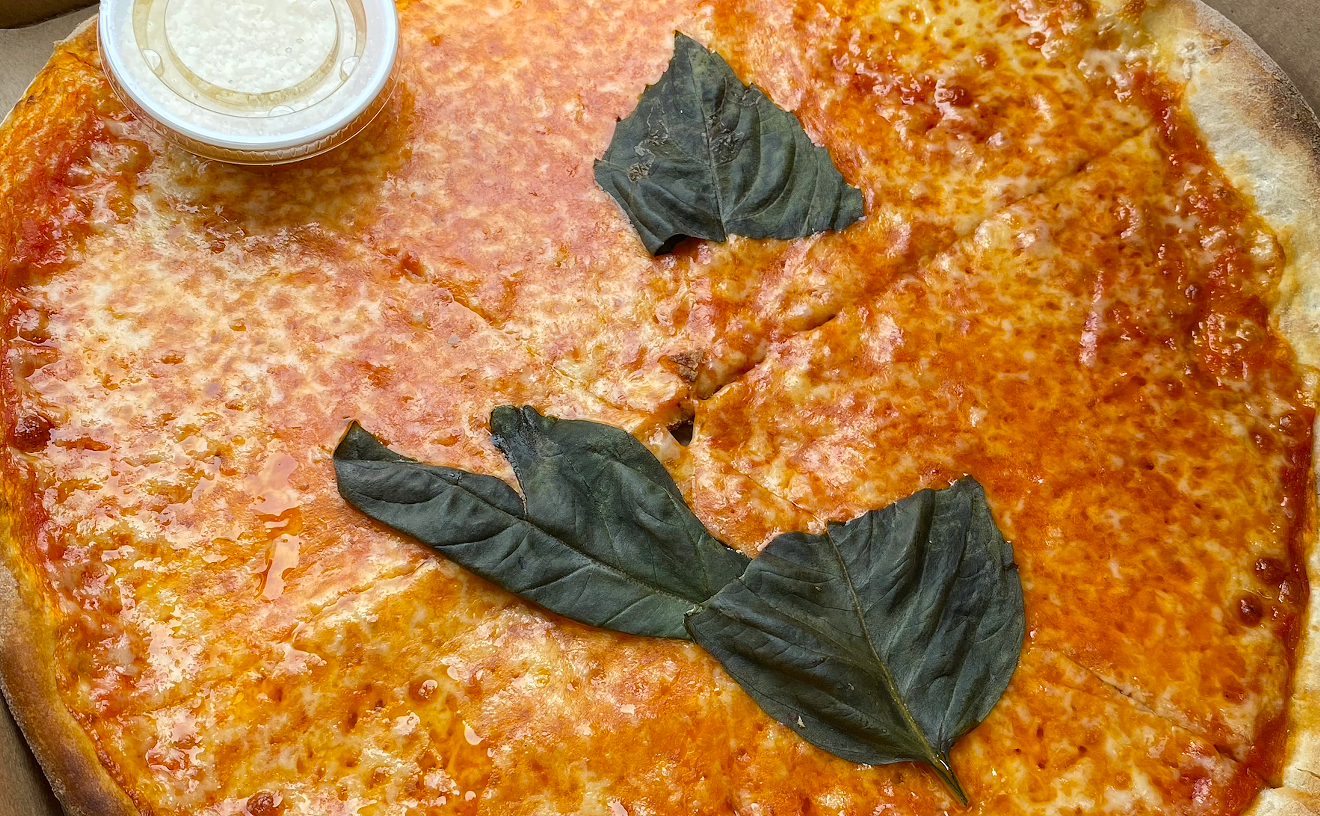I take no pleasure in seeing a restaurant fail, especially one that had as much going for it as Cuban café Brisa Atlantica in Delray Beach. But it does allay the fierceness of the sting when the joint that moves in to replace it has as much to offer as Carolina's Coal Fired Pizza & Pasta. New owner Enrico Esposito lucked into quite a deal, because the previous restaurateur, Israel Torres, spent more than a year and a small fortune gutting and renovating the decrepit, 1932 Key West-style cottage on SE Seventh Avenue before he was able to serve his first plate of ropa vieja. Unfortunately, that ropa vieja was what sealed Brisa's fate, because as charming and beautiful as the space was, the food was just never very good.
Still, I remember rainy spring nights there when the notes from the Cuban jazz band tumbled through those thrown-open windows and couples rumbaed on the covered porch despite the humidity. Brisa could be poignant and romantic. It had an air of exclusivity, since the house is removed from packed and punchy Atlantic Avenue — you turn the corner from the main drag and find yourself a world apart.
Carolina's maintains that fiction: It still feels half-secret and slightly foreign — even if the locale it's referencing is as much Brooklyn as Napoli, where Esposito's mother, Carolina, and grandmother, Dora, owned the restaurants that handed down to him their sauce and pizza recipes. Everybody on staff at Carolina's, for example, speaks in a lilting accent. And given the Italian kitsch on the walls and the big blow-up photo of Carolina making pasta in her vintage kitchen, given the smoky fragrances emanating from the coal oven behind the bar, you'd be forgiven if you identified those accents as Italian (in fact, the staff here, although uniformly dark-eyed, olive-skinned, and ridiculously good-looking, are as likely to come from Brazil or Russia). As with Dada a few blocks away, the old Florida cottage setting generates a good deal of warmth and nostalgia: "Come as Strangers, Leave as Family" reads the blurb on the menu — no idle promise.
I had my first pie at Carolina's with my friend Steve Ellman, the pickiest pizza man I know — New York-born, the guy who dragged me to the famous Di Fara's in Brooklyn and made me wait three hours in line for what he promised would be the best pizza of my life. (Di Fara's actually scored slightly below the pie I had in Rome 30 years ago and can still memory-taste as if it were yesterday.) South Florida, as I've noted before in this column, has become the coal-fired pizza capital of the United States since we're one of the few places the entrepreneur can install a coal oven without having to worry about pesky environmental regulations. (Coal ovens, as it turns out, are not quite as polluting as their reputation implies — new filters cut down considerably on environmental impact. But that's another story.)
The point of using coal, of course, is that it burns hotter, at around 800 degrees, than any other heat source, including electricity, gas, and wood. What that means for you, my discriminating pizza maven, is that the crust ideally achieves an unparalleled ratio of crispness, chewiness, and lightness that has nothing in common with Domino's or Pizza Hut. The pizza oven at Carolina's is brick-walled with an open vent at the front; if you sit at the bar, you'll see the pizza maker shifting pies around so they maintain the right distance from the coal flames at the rear. It takes about three minutes for each pie to cook; in his leisure time, he's patting down the dough, stretching it on two raised fists, dusting it with corn meal, and layering on ingredients like a maniac.
But that bubbly, blackened, coal-oven crust is only one reason a good pizza parlor is universally loved. Other considerations go into the mix — price, the delectability of salad and antipasti, the availability of decent table wine, the quality of the sauce, the cuteness of the staff's T-shirts, and the presence and joviality of the owner. Carolina's aces all. The quiet Wednesday night we first tasted our Pizza Carolina (fresh mozzarella, basil, pomodoro sauce, $16) and our Procida (sliced meatballs, prosciutto, mozzarella, pomodoro, and ricotta, $19.50 — each pizza feeds two to three) was a gentle introduction; weekends are a zoo, though the raucous energy of a Friday night at 8 o'clock is amusing and infectious. The pizza's absolutely delicious eaten in either a packed house or a half-empty one. We quibbled a little over the quality of this thin, crisp crust; it's not quite as blackened and bubbled as Anthony's, and Ellman missed a certain chewiness, but it had a lovely hint of sweetness that I really liked set against the tart, chunky, thoroughly excellent pomodoro. I hate the sugary, mucky tomato sauce you get on corporate pizzas — Carolina's version is neither overcooked nor oversweetened, and they're using a quality canned tomato to make it (i.e., not metallic or bitter). This easy pizza, topped with just cheese, sauce, and a chiffonade of herbs, sets the bar pretty high. Carolina's closest competitors (Anthony's, which has recently opened an outlet in Boynton; Vic and Angelo's; Red Rock; Coal Mine; and Fire Rock) are going to have to train hard if they want to keep leaping over it.
Four other versions were good too: the Procida, a thick layer of creamy ricotta and mozzarella overlaid with slices of meatball, generous sheets of prosciutto, and a post-oven scattering of Parmesan and basil; a sauceless Napoli ($17.50) with fresh sliced tomatoes, mozzarella, and basil; the Capri ($18.50) glistening with sautéed eggplant slices, black olives, mozz, and fresh mushrooms; and a Vesuvio ($18.50) with multicolored roast peppers, mozz, and crumbly sausage. Or make up your own from some combination of pepperoni, artichoke hearts, arugula, sun-dried tomatoes, and extra cheese at $2 to $2.50 per ingredient.
Enrico's chopped salad ($8.50, easily feeds two) achieves perfect balance and acidity with its mix of salami, Gorgonzola, mixed greens, roasted peppers, cherry tomatoes, red onion, and black olives. It's totally addictive. Nonna Dora polpettone (Enrico's grandma Dora's meatballs, an appetizer at $9.95) are giant-sized, dense as black holes, set in a pool of that excellent pomodoro sauce, and generous enough to split if you happen to be dining with somebody who isn't a selfish pig. Baked clams oreganata ($9.95), littlenecks dusted with bread crumbs and herbs and served piping hot with a wedge of lemon, are swoon-inducing. The appetizers arrive with a cone of warm, coal-oven-baked bread sticks, a bottle of Colevita olive oil, and one of balsamic vinegar.
All this is made to be washed down with Italian wine, and Carolina's has an impressive, fairly priced list by the bottle or quartino. The quartinos, about two glasses' worth, are a particularly good deal — I had a sharp and fruity young Sangiovese for $11 — and there are Chiantis, Amarones and baby Amarones, pinot grigios and Chardonnays from Italy, as well as a respectable selection of California wines.
I'm sorry to say I have yet to try the pastas, priced from $12.95 to $15.95. Among them are Dora's meatballs with spaghetti, a homemade parpardelle Bolognese, linguine puttanesca, handmade ravioli, and orecchiette with sausage and broccoli rabe. For lunch, you can order paninis too.
The reception by staff and owner was easy and friendly. We waited a long time for our pizzas on a busy Friday night, but as they were plying us with plates of steaming, deeply tasty appetizers, and quartinos of wine, the delay felt more like a piece of unexpected luck than a hassle. It's getting to the point that you can find a Neapolitan pie to rival the best of New York down here without hardly having to spin around and say the word mozzarella. And even with the glut of coal-fired ovens, if there ever were a bona fide hedge against failure in the restaurant biz, it's a damned fine pizza.










